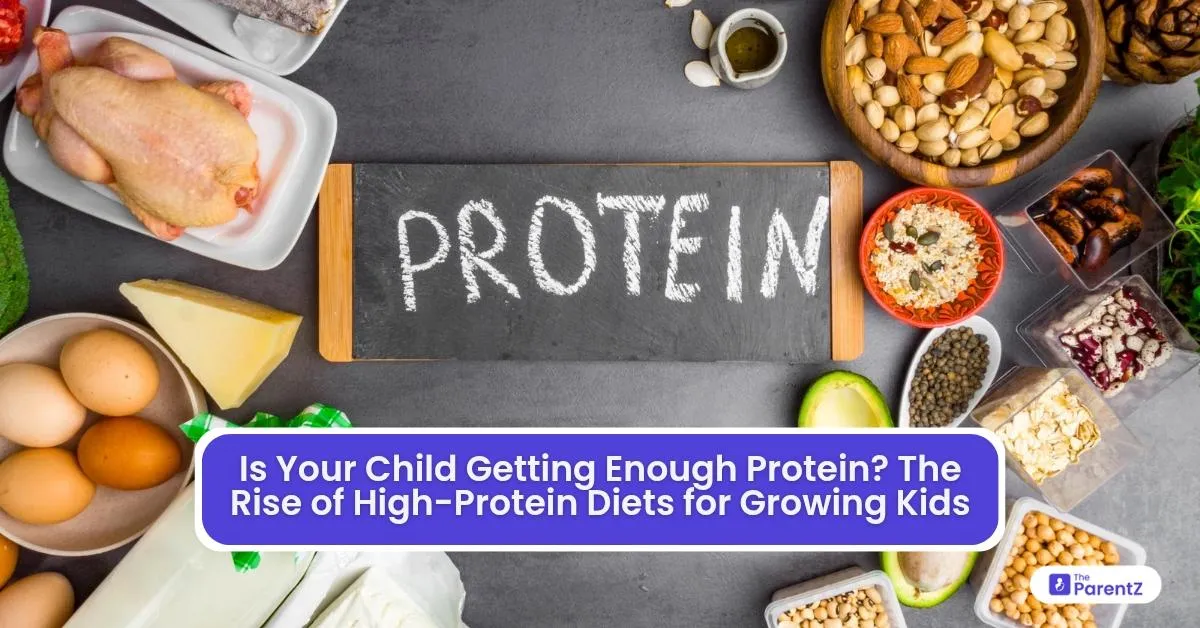The Protein Craze Reaches the Playground
From protein-fortified biscuits to shakes marketed for “strong growth,” high-protein diets have become a buzzword even in households with young children. Parents are increasingly worried about whether their kids are getting “enough” protein, especially amidst trends promoting muscle growth, immunity, and better concentration.
But are these concerns justified? Can too much protein do more harm than good? And what does the science actually say about protein needs in growing children?
Why Protein Matters in Childhood
Protein is essential for:
- Growth and Development: Children need protein to build muscles, organs, skin, and tissues.
- Enzyme and Hormone Production: Many hormones and enzymes critical to development are made of protein.
- Immune Support: Antibodies, which defend the body from infections, are protein-based.
- Repair and Recovery: Protein helps heal injuries and maintain healthy cells.
How Much Protein Does a Child Really Need?
The Indian Council of Medical Research (ICMR, 2020) and international guidelines like those from the Institute of Medicine (US) recommend the following daily protein intake:
| Age Group | Protein Requirement (g/day) |
| 1–3 years | 13–16 g |
| 4–6 years | 20 g |
| 7–9 years | 25 g |
| 10–12 years | Boys: 32 g; Girls: 31 g |
| 13–18 years | Boys: 45–54 g; Girls: 40–46 g |
These amounts are easily met through a balanced Indian diet including dal, dairy, grains, and vegetables.
Common Protein-Rich Indian Foods for Kids
| Food Item | Protein Content (per 100g) |
| Moong Dal (cooked) | 7 g |
| Paneer | 18 g |
| Eggs (1 large) | 6–7 g |
| Chicken (cooked) | 27 g |
| Milk (250 ml) | 8 g |
| Soya chunks (cooked) | 16 g |
| Peanut butter (1 tbsp) | 4 g |
| Rajma/Chana (cooked) | 6–7 g |
A simple meal of dal-chawal, curd, and vegetables can provide most of the required protein for a preschooler.
The Rise of High-Protein Products: Are They Necessary?
The market is flooded with:
- Protein biscuits
- Ready-to-drink protein shakes
- Protein powders for kids
- High-protein milk and yogurt
But do healthy children need supplements or fortified products?
Not usually.
Healthy kids who eat a varied diet rarely need extra protein.
The American Academy of Pediatrics (AAP) and the European Society for Paediatric Gastroenterology Hepatology and Nutrition (ESPGHAN) both advise against unnecessary protein supplementation unless a child has:
- A medical condition (e.g., protein malabsorption, burns, failure to thrive)
- A strict vegan diet without adequate protein planning
- Specific athlete training (only in teens)
The Risks of Too Much Protein
Overloading a child’s diet with protein, especially from animal-based or processed sources — can backfire.
Potential Risks Include:
- Kidney Strain: Excess protein increases nitrogen waste, potentially burdening immature kidneys.
- Dehydration: More protein requires more water for excretion, raising the risk of dehydration.
- Nutrient Imbalance: High-protein diets often displace fruits, veggies, and carbs — critical for energy and micronutrients.
- Obesity Risk: Some high-protein foods (like cheese or processed meats) are calorie-dense and may increase fat intake.
- Early Puberty: Excess protein, especially from dairy, has been loosely associated with early menarche in girls (Journal of Nutrition, 2010).
When Should You Worry About Low Protein?
Though rare, children can be protein-deficient if they have:
- Severe picky eating
- Chronic diarrhea or malabsorption
- Highly restricted diets
- Malnutrition (as seen in kwashiorkor)
Signs of protein deficiency:
- Poor growth or weight gain
- Frequent infections
- Fatigue
- Delayed wound healing
- Swollen belly (in severe cases)
If concerned, consult a pediatrician or pediatric dietitian before turning to supplements.
What About Vegetarian or Vegan Kids?
A well-planned vegetarian diet can easily meet protein needs with:
- Pulses and legumes
- Dairy and eggs (if ovo-lacto)
- Nuts, seeds, and whole grains
- Soy products like tofu or soy milk
For vegan children, ensure enough calorie intake and consider vitamin B12 and iron supplementation.
Tips for Ensuring Enough Protein Naturally
- Include protein in every meal – A mix of cereal-pulse combinations like khichdi, idli-sambar, or roti-chana works well.
- Snack smart – Offer roasted chana, curd with fruit, or boiled eggs.
- Rotate sources – Use a mix of dairy, dals, eggs, soya, nuts, and grains.
- Don’t obsess over numbers – Observe energy, immunity, and growth rather than tracking grams.
Conclusion: Protein Is Important, But Balance Is Key
Protein is vital for your child’s growth, but more is not always better. Most Indian children meet their needs through home-cooked meals. Over-reliance on high-protein packaged foods or supplements may do more harm than good.
Encourage balanced eating, not over-supplementation. And if you’re ever unsure about your child’s nutrition, consult a pediatric dietitian, not a product label.
References
- Indian Council of Medical Research (ICMR). Recommended Dietary Allowances (RDA) 2020.
- American Academy of Pediatrics. Nutrition and Your Child: Protein Intake.
- Koletzko B, et al. (2012). ESPGHAN Commentary on Complementary Feeding. Journal of Pediatric Gastroenterology and Nutrition.
- Wiley AS. (2010). Milk Intake and Puberty Onset. Journal of Nutrition, 140(3), 477–483.
- World Health Organization. Protein and Amino Acid Requirements in Human Nutrition. (WHO Technical Report Series 935)





Be the first one to comment on this story.